ChatGPT customer service refers to the use of OpenAI’s advanced language model to assist with client support operations. It involves integrating ChatGPT’s natural language processing and generation capabilities into customer service workflows and channels.
This integration allows businesses to leverage the AI’s conversational abilities to understand and respond to customer inquiries. The system can also troubleshoot issues and deliver personalized support experiences through natural dialog across multiple touchpoints.
Are you exploring ways to improve your company’s support capabilities while increasing efficiency? If so, you’ll want to learn about the exciting potential of leveraging ChatGPT customer service.
Use conversational AI to enhance your customer service
Microsoft Bing, Amazon, Google and other big tech companies have been in an AI race for some time now. While each one has a different specialty, we’ll focus on OpenAI. Or more specifically, how it can help your business.
So, without further ado, let’s get started.
How to use ChatGPT for customer service?
Automations are starting to be visible all around us. You can now connect many platforms like your website, LinkedIn, your podcast, social media, and more with the help of APIs. The information is moved freely between the different channels, and you get an omnichannel view of your online presence.
But how can businesses use this software to improve customer experience?
Here are two main ways businesses utilize OpenAI for customer service:
Using a ChatGPT customer service chatbot
Businesses can integrate GPT into their existing chatbot platforms or use a new software that provides bots powered by the language model. This system can be deployed on the company’s website, mobile app, or messaging platforms like Facebook Messenger, WhatsApp, etc.
So, how would that work?
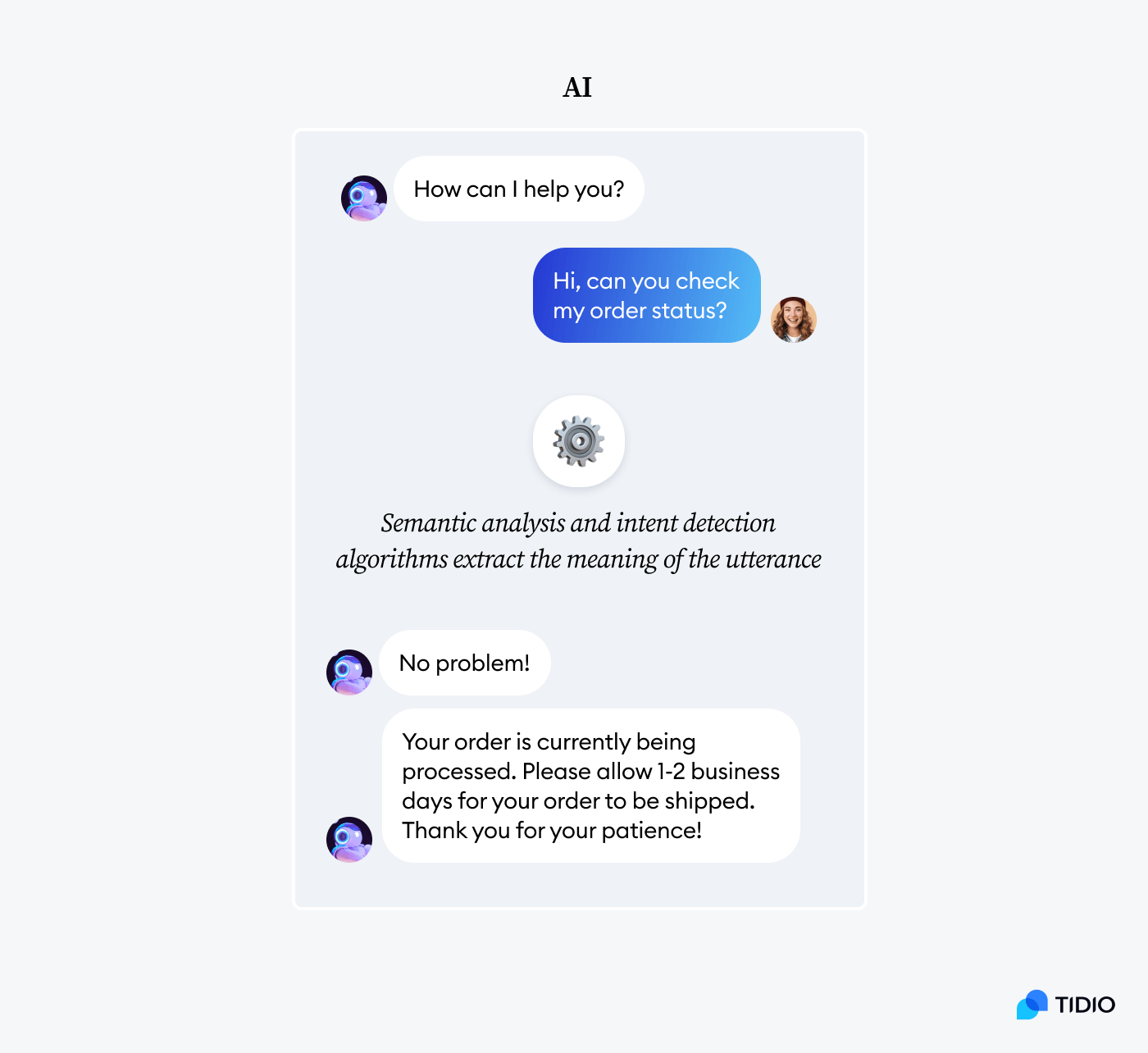
When a customer initiates a conversation, the ChatGPT chatbot can understand their query and provide relevant information from the business’s knowledge base. On top of that, the system can offer personalized recommendations and handle tasks like booking appointments, processing orders, or addressing complaints.
For example, if a customer asks, “What is your return policy?”, the ChatGPT customer service chatbot can provide the company’s refund policy in a clear and conversational manner, rather than just pulling up a static FAQ page.
Ecommerce businesses can use AI chatbots to provide personalized product recommendations based on the customer’s preferences and previous purchases. The bot can engage in a dialog to better understand what the customer is looking for and make tailored suggestions.
Additionally, ChatGPT’s language capabilities allow the chatbot to handle multi-turn conversations, context switching, and understand the intent behind questions asked in a conversational way. This makes the customer experience more natural and human-like.
Read more: Learn how to use Tidio’s conversational AI, Lyro to its fullest potential.
Using OpenAI to create professional replies to clients
Another way businesses can leverage OpenAI is to create professional, tailored replies to client inquiries. Instead of sending out generic canned responses, businesses can input the details of a customer’s inquiry into ChatGPT and have it generate a personalized, on-brand reply. This ensures responses are contextual and nuanced, while maintaining a professional tone.
For example, a software company receives a support ticket about a specific error the customer has encountered. The representative can insert the error details to ChatGPT that crafts a polite, easy-to-understand explanation of the issue and troubleshooting steps tailored to the user’s setup.
For customer queries or complaints coming from social platforms like Twitter, Facebook, etc., ChatGPT can quickly formulate public-facing replies. These responses acknowledge the issue, provide information, and maintain the brand’s voice.
OpenAI’s models can also study product details to customize sales proposals, pitch decks or estimate quotations for each prospective client. On top of that, the system can base the quotes on the specific user requirements gathered through conversations.
By leveraging OpenAI, businesses can provide timely, nuanced, and brand-compliant responses at scale, while avoiding the need to manually create each one from scratch. The language model ensures professionalism while allowing personalization. But as with every technology, ChatGPT has its limitations, so let’s have a look at those.
Read more: Discover how to use customer service automation and boost your performance.
Limitations of ChatGPT customer service
Sometimes the functionality of the AI-powered system can be seen as lacking. Even though it communicates in human language, we need to remember that it is a software, and it needs to work alongside your customer support team for best results.
Here are some limitations of the system when it comes to client support:
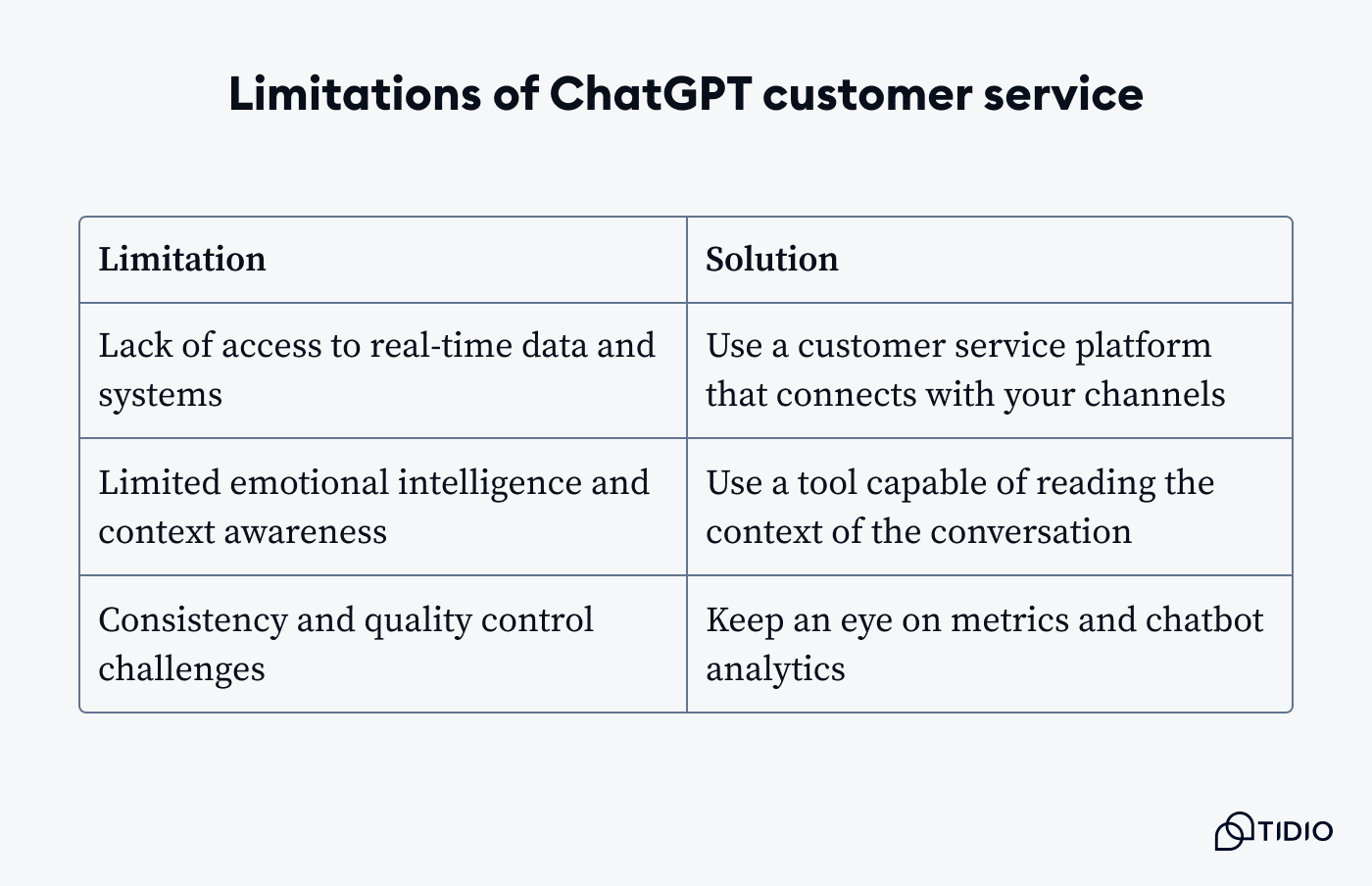
Lack of access to real-time data and systems
While ChatGPT can provide general information based on its training data, it can’t directly access a company’s live databases, order systems or inventory management software. This means that ChatGPT may not be able to provide fully accurate or up-to-date responses for very specific customer queries without integrating with the business’s internal systems.These include things like order status and account details.
Solution to the limitation
You can use customer support software like Tidio. This tool can automatically connect to your systems, get question-answer pairs from your knowledge base, and update information regarding client orders.
Limited emotional intelligence and context awareness
While quite advanced, ChatGPT still struggles with understanding subtle emotional cues, sarcasm, or highly specific contexts from customers. It may provide responses that are factually correct, but tonally inconsistent or lacking the emotional intelligence that human agents can provide, especially in dealing with distressed or angry customers.
Solution to the limitation
Use a tool that is able to keep the context of the conversation. For example, Lyro has an enhanced ability to understand the context of each interaction and answer follow-up questions.
Don’t be left behind, boost your customer service performance using AI
Consistency and quality control challenges
Since ChatGPT generates unique responses based on its training data, there’s an inherent challenge in ensuring consistency of information across different conversations. This could mean that two different customers may get slightly varied answers for the same query.
Additionally, ChatGPT for customer support sometimes hallucinates and produces incorrect or nonsensical outputs. That’s why it still requires monitoring and quality control measures that may undermine some of the efficiency gains of using an AI system.
Other potential limitations that could be explored are data privacy/security concerns, lack of multilingual capabilities, and difficulties with multitasking or task switching during conversations.
Solution to the limitation
Use a solution that provides chatbot analytics and keep an eye on your metrics. This way, you’ll be able to spot any inconsistencies and fix the small issues before they become a real problem.
With all that said, businesses can still enjoy the benefits of this software. So, let’s examine some successful companies that use OpenAI for customer support.
Companies using ChatGPT for customer service
Large language models (LLMs) like GPT-3.5 and GPT-4 that use machine learning can boost user experience on your website and improve the productivity of your team. No wonder more and more businesses are starting to use AI tools for customer service. In fact, more than 55% of companies engage in implementing AI to their companies as we speak.
How do they do it?
Well—here are three real-life examples of companies using ChatGPT for customer support purposes:
YETI
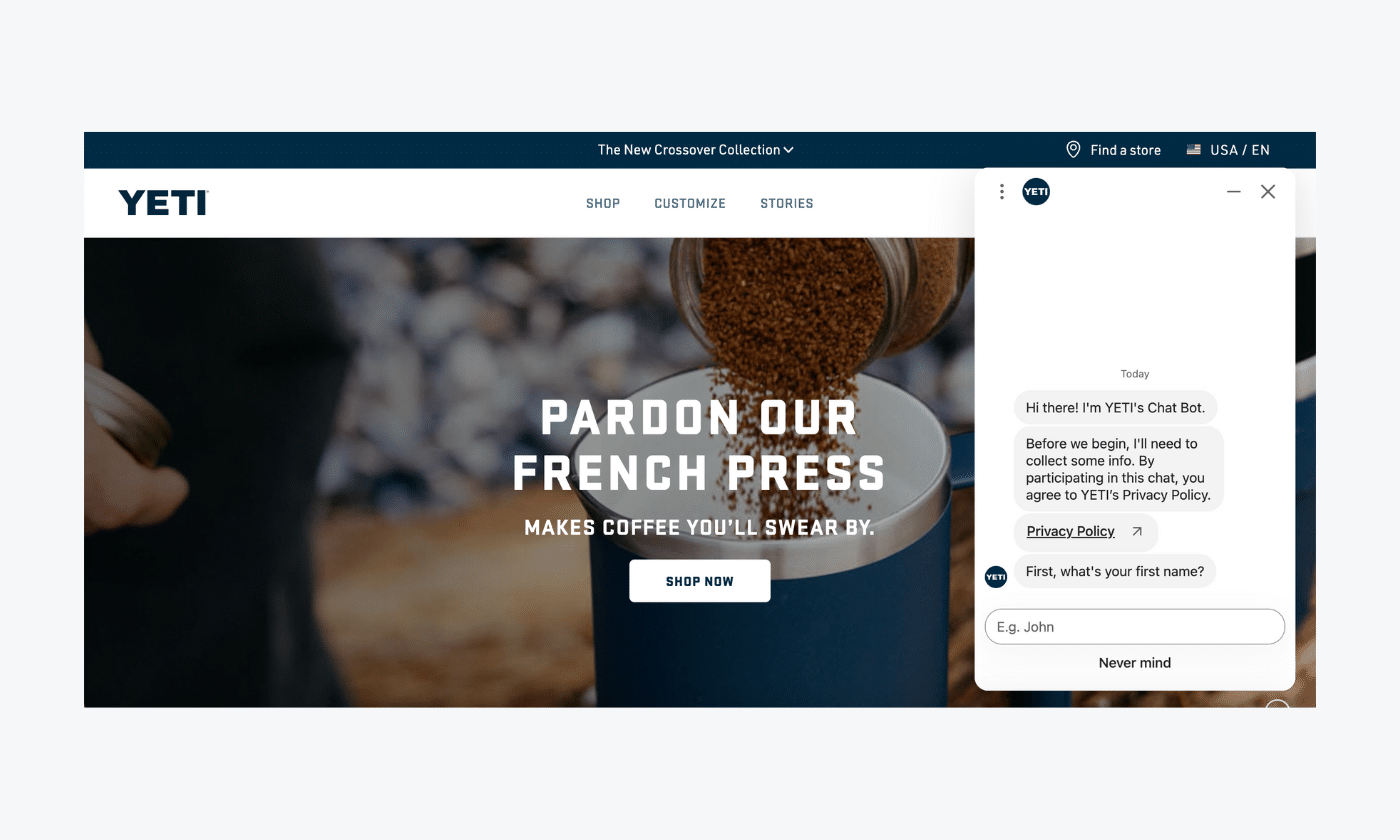
You’ve probably heard about them. YETI is an American company that produces outdoor products including vacuum-insulated stainless-steel drinkware, ice chests, soft coolers, and more. This brand uses OpenAI customer service to collect leads, as well as answer common questions from shoppers.
Did you know that…
Over 97% of business owners believe ChatGPT can help their business. On top of that, around 78% of customer service professionals say that AI enhances their efficiency at work.
Anthropic
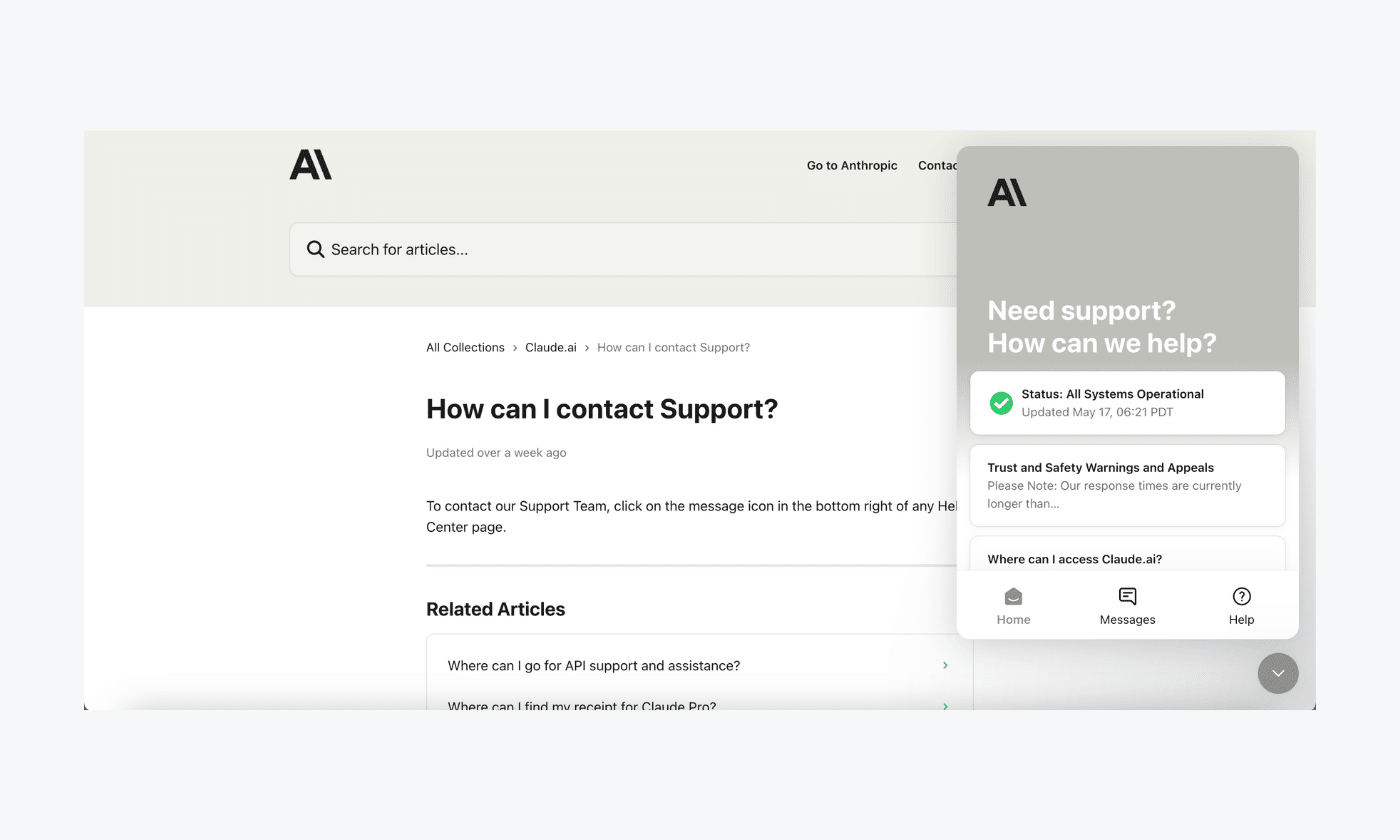
Anthropic, the company behind ChatGPT’s rival AI model Claude, is using ChatGPT to assist with customer support inquiries. They have integrated ChatGPT into their workflows to provide initial responses to common questions from users and pass more complex issues to human agents. This allows the support team to handle a higher volume of inquiries more efficiently.
Vainu
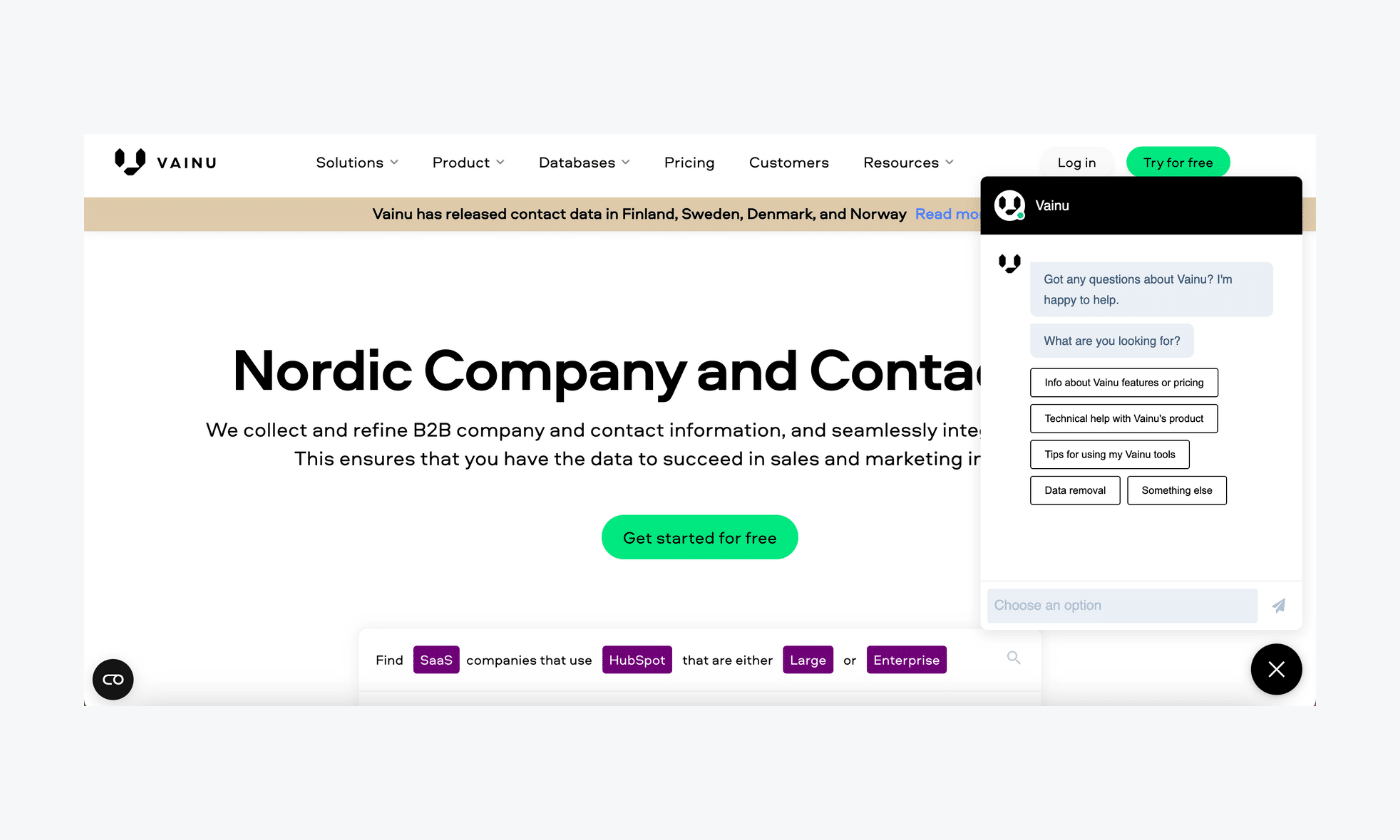
Vainu, a Finnish sales intelligence platform, is experimenting with using ChatGPT as a virtual assistant. They plan to train the AI on their product data and have it engage with customers to answer queries, provide guidance on using the platform, and even suggest new product features based on conversational inputs.
While still in relatively early stages, these companies showcase how ChatGPT can be leveraged across different use cases. As AI technology matures, we may see wider adoption for augmenting and scaling customer support operations.
Read more: Discover how eye-oo boosted sales by €177K using Tidio’s conversational AI.
But will ChatGPT ever replace human agents? Let’s dig into that.
Will ChatGPT replace customer service?
The quick answer to this question is No. It’s highly unlikely that ChatGPT or a similar generative AI model will completely replace human agents in the foreseeable future. While ChatGPT can certainly augment and assist with customer service workflows, significant limitations would prevent it from fully replacing live agents.
These include:
- Lack of emotional intelligence
- Limited context and integration
- Quality control issues
Instead of full replacement, the more likely scenario is that ChatGPT and similar AIs will be leveraged to augment, assist, and enhance the productivity of human customer service teams. AI could handle routine queries, answer frequently asked questions, draft responses for agents to finalize, and provide suggestions during conversations.
However, companies will still rely on human agents for more complex, emotionally charged, or context-specific customer interactions. That’s because they can provide the empathy, creative problem-solving, and critical thinking capabilities that AI cannot fully replicate.
The future of customer service is likely a symbiotic combination of human and artificial intelligence working in tandem rather than an outright replacement of humans by AI.
ChatGPT customer support: summary
Integrating advanced AI like ChatGPT into customer service operations opens up new. exciting possibilities for businesses. By leveraging ChatGPT’s conversational abilities, companies can provide fast, personalized, and cost-effective support experiences that delight customers and boost operational efficiencies.
From automating routine inquiries to drafting detailed responses, triaging issues, and engaging in helpful dialogs, ChatGPT presents a powerful way to augment and scale support. Its contextual understanding allows it to guide customers through resolving complex problems while maintaining a natural, friendly tone.
However, it’s important to be aware of ChatGPT’s current limitations around real-time data integration, quality control challenges, and the inability to replicate true emotional intelligence. Implementing robust human oversight, continual model training, and a symbiotic human-AI approach is vital if you want to use the technology to its fullest potential.
Looking ahead, the applications of generative AI in customer support are set to evolve rapidly. As language models grow more capable and businesses gain more experience leveraging them, we may see entirely new AI-driven support paradigms emerge. Self-service channels could become incredibly conversational and predictive support could proactively resolve issues before they escalate.
One thing is certain—businesses that strategically embrace generative AI like ChatGPT for customer service today will be well-positioned to capitalize on future developments.
For now, the best option available for you is to choose a platform that offers ChatGPT qualities for your customer service. So, why not start today?
Use the best AI customer service software out there

